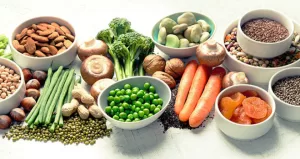Colorectal Cancer and Diet: Foods to Eat and Avoid
Colorectal cancer, also known as bowel cancer, is a significant health concern in Singapore, where it ranks among the most common cancers. While many factors influence the risk of colorectal cancer, diet plays a crucial role in prevention and maintaining bowel health. By adopting a healthy, balanced diet with the right foods, individuals can reduce their risk and support overall digestive wellness. This article explores the foods to eat and avoid to lower colorectal cancer risk, along with practical nutrition tips for cancer prevention in Singapore.
Foods to Eat for Colorectal Cancer Prevention
- High-Fiber Whole Grains
Incorporate whole grains like brown rice, whole wheat bread, oats, and barley into your diet. These foods are rich in dietary fiber, which helps keep the bowels healthy by promoting regular bowel movements and supporting beneficial gut bacteria. Fiber also helps reduce the time potential carcinogens spend in the colon, lowering cancer risk. The Singapore Health Promotion Board recommends daily fiber intakes of about 20 grams for women and 26 grams for men, achievable through servings of whole grains, fruits, and vegetables.
- Colorful Fruits and Vegetables
A diet rich in a variety of fruits and vegetables provides essential vitamins, minerals, and antioxidants that combat inflammation and oxidative damage linked to cancer development. Cruciferous vegetables such as broccoli, cabbage, cauliflower, and kale are especially beneficial due to their cancer-protective compounds. Eating a rainbow of produce ensures a broad spectrum of phytochemicals, such as beta-carotene, lycopene, lutein, and other antioxidants.
- Legumes and Beans
Beans, lentils, peas, and soy products are excellent sources of fiber, protein, vitamins B and E, and antioxidants. Their nutrients help reduce inflammation and may inhibit cancer cell growth. Incorporating legumes into regular meals supports both colon health and overall nutrition.
- Calcium-Rich Dairy Foods
Calcium intake from dairy products like milk, yogurt, and cheese has been associated with a reduced risk of colorectal polyps and cancer. Calcium may protect the lining of the colon by binding to potential carcinogens.
- Omega-3 Rich Fish
Fatty fish such as salmon, mackerel, and sardines are rich in omega-3 fatty acids, which have anti-inflammatory and cancer-fighting properties. Including these fish as part of a balanced diet supports colon health and general well-being.
Foods to Avoid or Limit
- Red and Processed Meats
High consumption of red meat (beef, pork, lamb) and processed meats (sausages, bacon, ham) has been linked to an increased risk of colorectal cancer. Cooking methods involving high heat, such as barbecuing or deep frying, can produce harmful compounds that raise cancer risk. It is advisable to limit red meat intake to moderate amounts (e.g., up to 2-3 times per week) and to avoid or minimize processed meats. - Sugary and Highly Processed Foods
Dietary patterns high in refined sugars, sugary drinks, and heavily processed foods can contribute to obesity, inflammation, and insulin resistance—all factors associated with cancer risk. Minimizing consumption of these items is important for colorectal cancer prevention and overall health.
- Excessive Alcohol
Regular alcohol consumption increases the risk of colorectal cancer. Drinking alcohol in moderation or abstaining entirely is recommended to reduce this risk.
Practical Tips for a Cancer-Preventive Diet in Singapore
- Fill half your plate with fruits and vegetables at every meal.
- Choose whole grains over refined grains for better fiber intake.
- Include a variety of protein sources such as fish, beans, and lean poultry.
- Limit intake of red and processed meats, and avoid high-heat cooking methods.
- Stay hydrated with water and minimize sugary beverages.
- Combine healthy eating with regular physical activity and maintain a healthy weight.
- Consult healthcare professionals or dietitians for personalized advice, especially if you have a family history of colorectal cancer or other risk factors.
Conclusion
Diet is a powerful factor in reducing the risk of colorectal cancer and supporting bowel health. In Singapore, where colorectal cancer is prevalent, adopting a balanced diet rich in fiber, colorful fruits and vegetables, legumes, calcium-rich dairy, and omega-3 fatty acids, while limiting red and processed meats, sugary foods, and alcohol, can significantly lower cancer risk. Combining these dietary strategies with an active lifestyle and regular screening offers the best protection. Making informed food choices today supports not only colon health but also overall well-being and cancer prevention.
For individuals seeking guidance on colorectal cancer prevention and nutrition, consulting a healthcare professional or dietitian can provide tailored strategies suited to your needs.
Disclaimer: The content for this article is for informational purposes only and is not a substitute for professional medical advice, diagnosis, or treatment. Always consult your oncologist with any questions regarding a medical condition. Do not disregard medical advice or delay seeking it based on information from this site.

